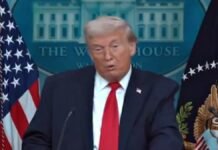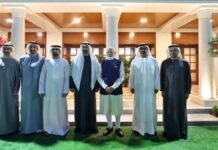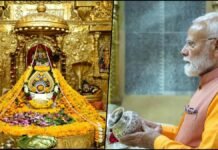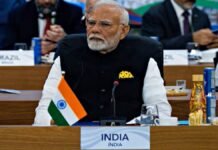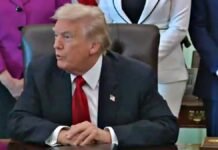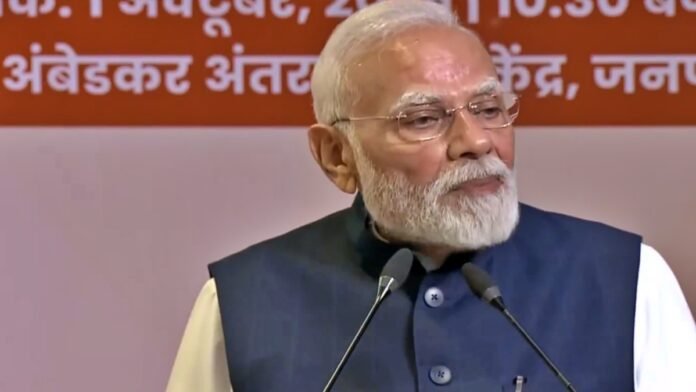
Key Points:
- Prime Minister Narendra Modi attended RSS centenary celebrations as chief guest in New Delhi on September 30, 2025
- First-ever Indian commemorative coin featuring Bharat Mata image released along with special postage stamp
- ₹100 commemorative coin bears RSS motto; stamp depicts RSS volunteers from historic January 26, 1963, Republic Day parade
- PM Modi praised RSS’s 100-year journey of sacrifice, selfless service, and personality development through shakhas (branches)
- Modi highlighted RSS volunteers’ service during 1947 Partition, 2001 Bhuj earthquake, 1984 Sikh riots, and natural disasters
- PM Modi described shakhas as “sacrificial altar for personality development” transforming individuals from “aham to vayam” (I to we)
- Prime Minister paid tribute to late RSS veteran and BJP leader Vijay Kumar Malhotra at event outset
New Delhi: Prime Minister Narendra Modi attended the centenary celebrations marking 100 years since the founding of Rashtriya Swayamsevak Sangh (RSS) as the chief guest at a grand event held in New Delhi on September 30, 2025. The milestone commemoration honored the organization established on Vijayadashami (Dussehra) day in 1925 by Dr. Keshav Baliram Hedgewar in Nagpur, Maharashtra, which has grown into one of the world’s largest volunteer organizations.
At the historic gathering, PM Modi released two special commemorative items to mark this extraordinary centenary: a ₹100 commemorative coin and a special postage stamp. The Prime Minister declared that “the RSS’s glorious journey of 100 years is an extraordinary example of sacrifice, selfless service, and nation-building,” adding that “our generation is fortunate to witness this moment.”
First Bharat Mata Image on Indian Coin
In his address describing the significance of the commemorative items, PM Modi revealed groundbreaking details about the newly released coin. “This is the first time a magnificent image of Bharat Mata has been imprinted on an Indian coin,” the Prime Minister announced, highlighting the historic nature of this numismatic release. The ₹100 commemorative coin also prominently bears the RSS’s organizational motto, symbolizing the sangh’s ideological foundation.
The special postage stamp released alongside the coin features images of RSS volunteers who participated in the legendary January 26, 1963, Republic Day parade in New Delhi. The stamp captures these volunteers marching in disciplined formation to patriotic tunes during that historic parade, which remains etched in the organization’s collective memory as a defining moment of national recognition.
Shakhas: The Foundation of Personality Transformation
Prime Minister Modi devoted significant attention to explaining the RSS’s unique organizational philosophy centered around its shakhas (branches). He described these daily gathering points as the fundamental building blocks of the organization’s approach to nation-building through individual transformation.
“The RSS chose the path of personality development for nation-building, which begins with its branches,” Modi stated. He characterized the shakhas as the “sacrificial altar for personality development,” where volunteers undergo profound personal transformation. The Prime Minister emphasized that at these branches, a volunteer’s journey from “aham to vayam” from “I to we”—is completed, representing the transition from individual ego to collective consciousness.
“It is said about the RSS that ordinary people come together to accomplish extraordinary tasks,” Modi observed. “This practice of dedication, service, and nation-building has formed the foundation of the RSS’s 100-year journey.” The Prime Minister’s remarks underscored how the organization’s decentralized network of thousands of shakhas across India has enabled widespread grassroots mobilization for various social causes.
Service During National Crises and Tragedies
PM Modi highlighted the RSS’s consistent role in responding to national emergencies and humanitarian crises throughout independent India’s history. “The RSS played a vital role in every challenge the country faced,” the Prime Minister declared, outlining a comprehensive record of volunteer service spanning seven decades.
He specifically mentioned the organization’s response to the traumatic Partition of India in 1947, when RSS volunteers provided relief and rehabilitation to millions of refugees fleeing violence and displacement across newly created borders. “From the pain of Partition to the Bhuj earthquake and other natural disasters, RSS volunteers have always stood at the forefront,” Modi stated.
The Prime Minister’s reference to the devastating 2001 Bhuj earthquake in Gujarat which killed approximately 20,000 people—acknowledged the massive relief operations conducted by RSS volunteers in the aftermath of that catastrophe. The organization mobilized thousands of workers for rescue, relief distribution, and long-term rehabilitation efforts in Gujarat’s Kutch region.
Shelter During 1984 Anti-Sikh Violence
In one of the most significant portions of his address, PM Modi directly referenced the RSS’s role during the traumatic anti-Sikh riots of 1984 that erupted following Prime Minister Indira Gandhi’s assassination. “Referring to the 1984 Sikh riots, PM Modi said that during that difficult time, many Sikh families took shelter in the homes of volunteers,” the report noted.
This acknowledgment carries particular historical weight, as the 1984 violence which resulted in thousands of Sikh deaths across Delhi and other cities remains one of independent India’s darkest chapters. Modi’s specific mention of RSS volunteers providing refuge to endangered Sikh families represents an official recognition of protection efforts during that communal tragedy, countering narratives that focus solely on the violence itself.
Tribute to Veteran Leader Vijay Kumar Malhotra
At the beginning of his address, Prime Minister Modi paid special tribute to Vijay Kumar Malhotra, a longtime RSS volunteer and senior BJP leader who passed away in 2024 at age 94. Malhotra served as a RSS pracharak (full-time volunteer) for decades before entering politics, eventually becoming a seven-term MLA in Delhi and serving multiple terms in the Lok Sabha.
Malhotra represented the generation of RSS workers who bridged the organization’s social work with political activism through the Bharatiya Jana Sangh and later the Bharatiya Janata Party. His dedication to both organizational work and parliamentary democracy exemplified the RSS’s influence on India’s political landscape over the past seven decades.
RSS’s Organizational Reach and Influence
The RSS centenary comes at a moment when the organization operates approximately 60,000 daily shakhas across India and in numerous countries worldwide, with an estimated active volunteer base of several million swayamsevaks (volunteers). The organization’s affiliated network includes hundreds of organizations working in education, tribal welfare, rural development, disaster relief, and cultural preservation.
Founded with just five volunteers in 1925 by Dr. Hedgewar in Nagpur, the RSS developed its distinctive organizational model based on physical training, character building, patriotic education, and social service. The organization faced bans during British rule and after Mahatma Gandhi’s assassination in 1948, but survived and expanded significantly in the post-independence period.
Prime Minister’s Personal RSS Connection
PM Modi’s presence as chief guest carries additional significance given his own biography as a former RSS pracharak who devoted his youth to full-time organizational work before entering Gujarat state politics in the 1980s. Modi’s journey from RSS volunteer to Chief Minister of Gujarat (2001-2014) to Prime Minister of India (2014-present) represents the most prominent example of RSS-trained leadership reaching the highest constitutional office.
The Prime Minister’s intimate familiarity with RSS organizational culture, philosophy, and working methods informed his detailed observations about shakhas and personality development. His description of the transformation from “aham to vayam” reflects deep understanding of the organization’s emphasis on sublimating individual identity into collective purpose.
Centenary Year Activities and Future Vision
The RSS centenary celebrations extend throughout 2025-2026, with the organization planning numerous commemorative events, publications, and special initiatives across India. The release of the commemorative coin and stamp represents just one element of a year-long celebration designed to showcase the organization’s century of work.
As the RSS enters its second century, the organization faces both opportunities and challenges in contemporary India. Its influence on the ruling BJP government, its expanding social service network, and its cultural nationalist vision continue to shape Indian public discourse and policy in significant ways.
The centenary moment provides an occasion for both supporters and critics to assess the RSS’s profound impact on independent India’s social, cultural, and political development over the past century an influence that Prime Minister Modi’s presence and words at the celebration unmistakably highlighted and endorsed.


































